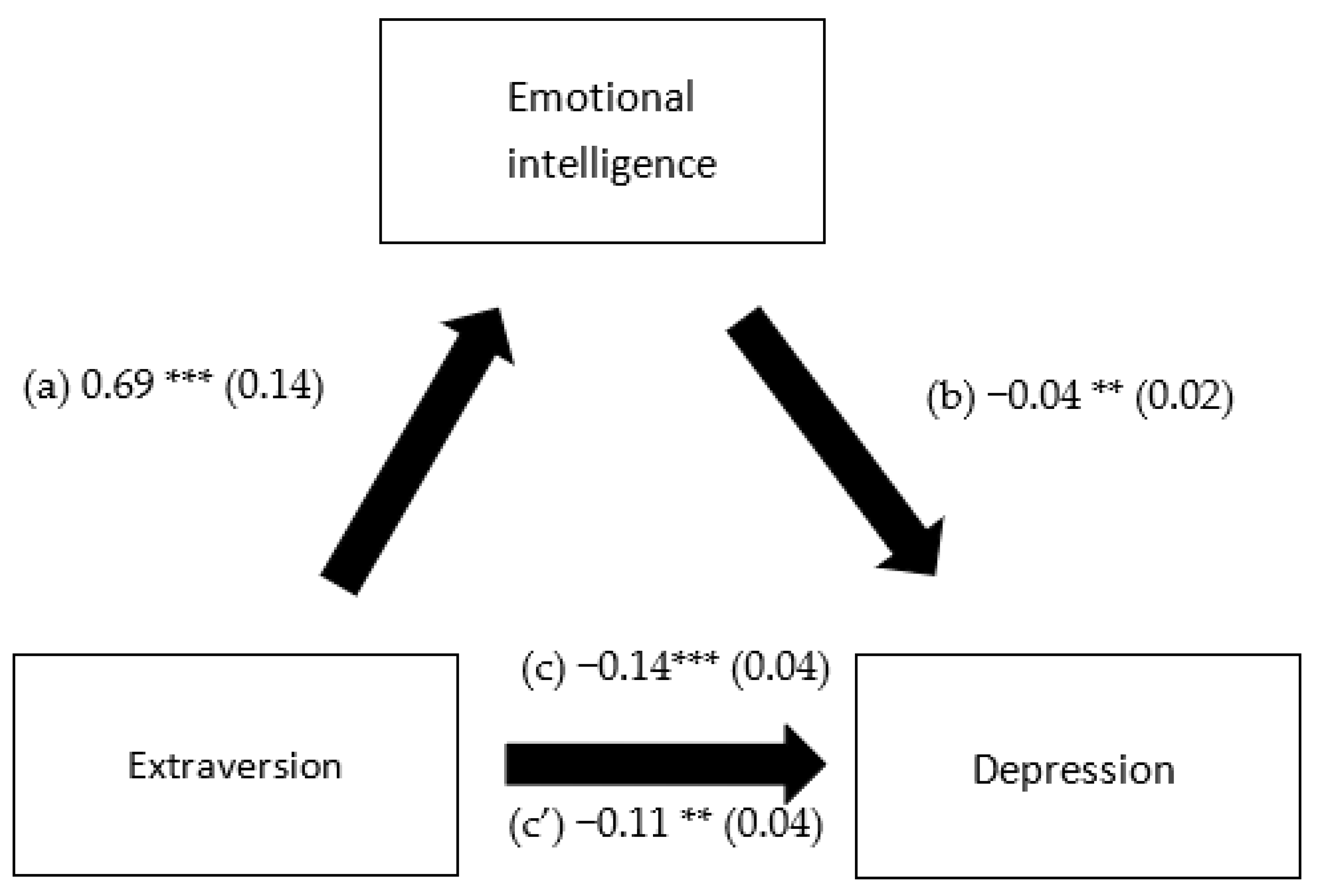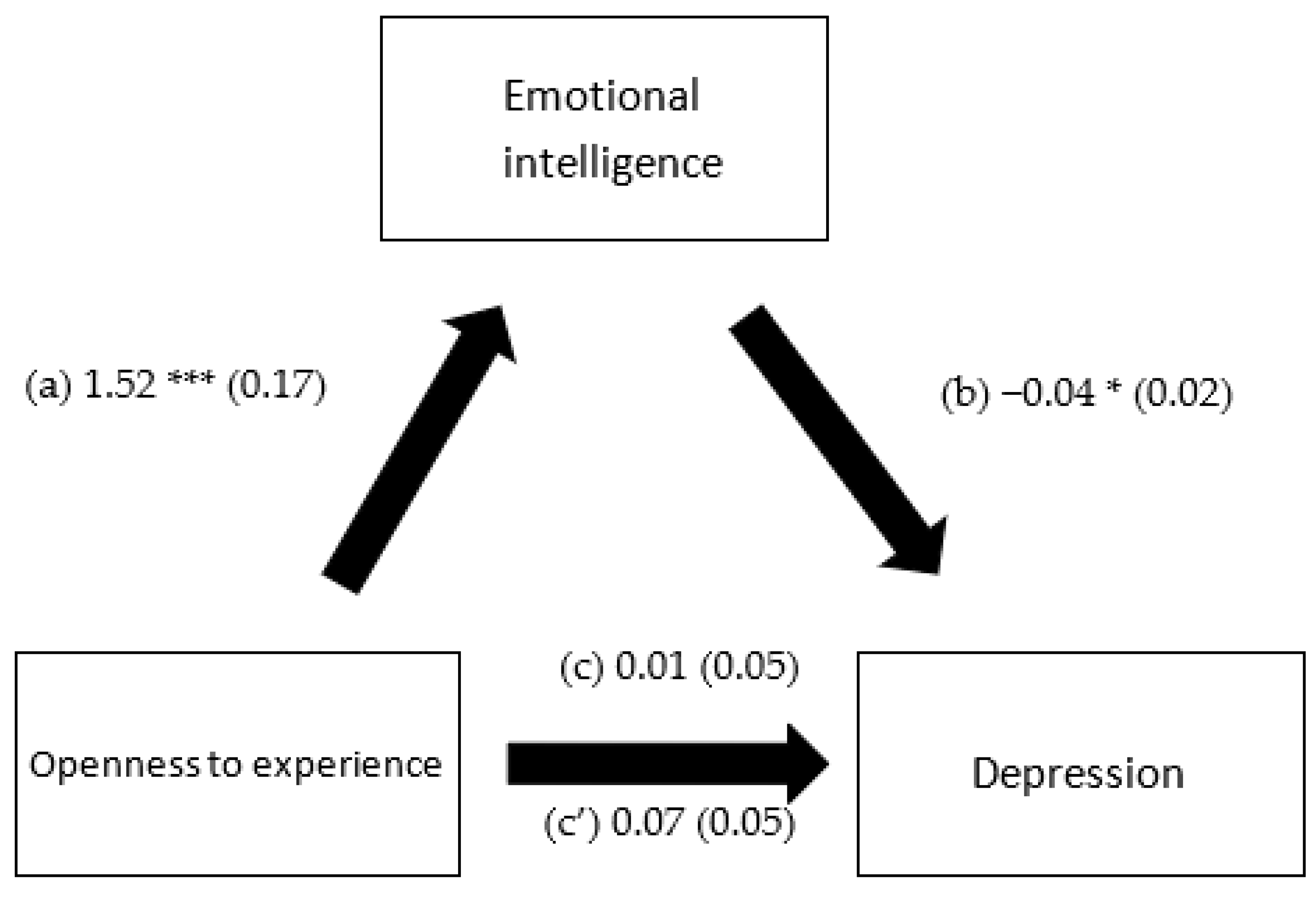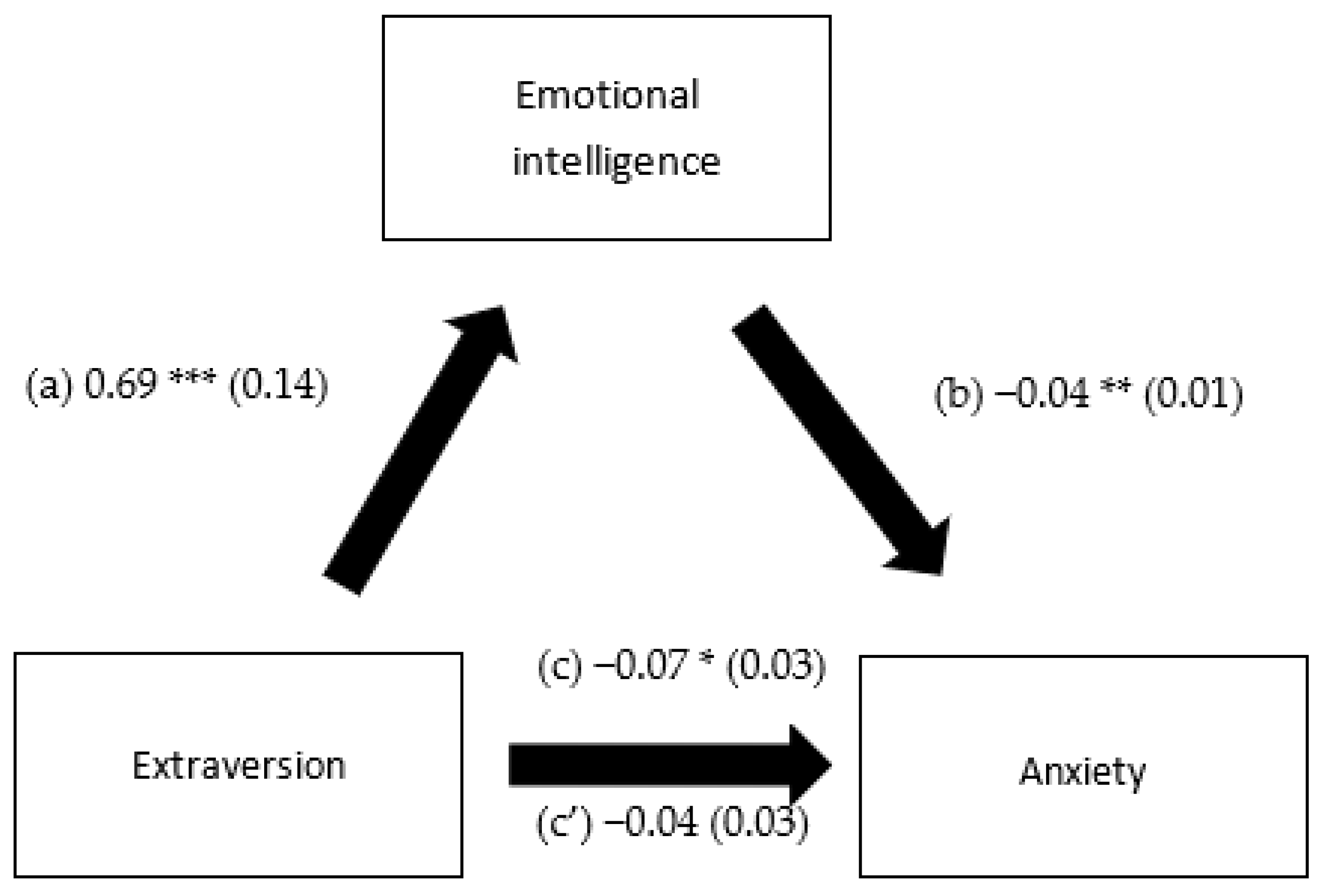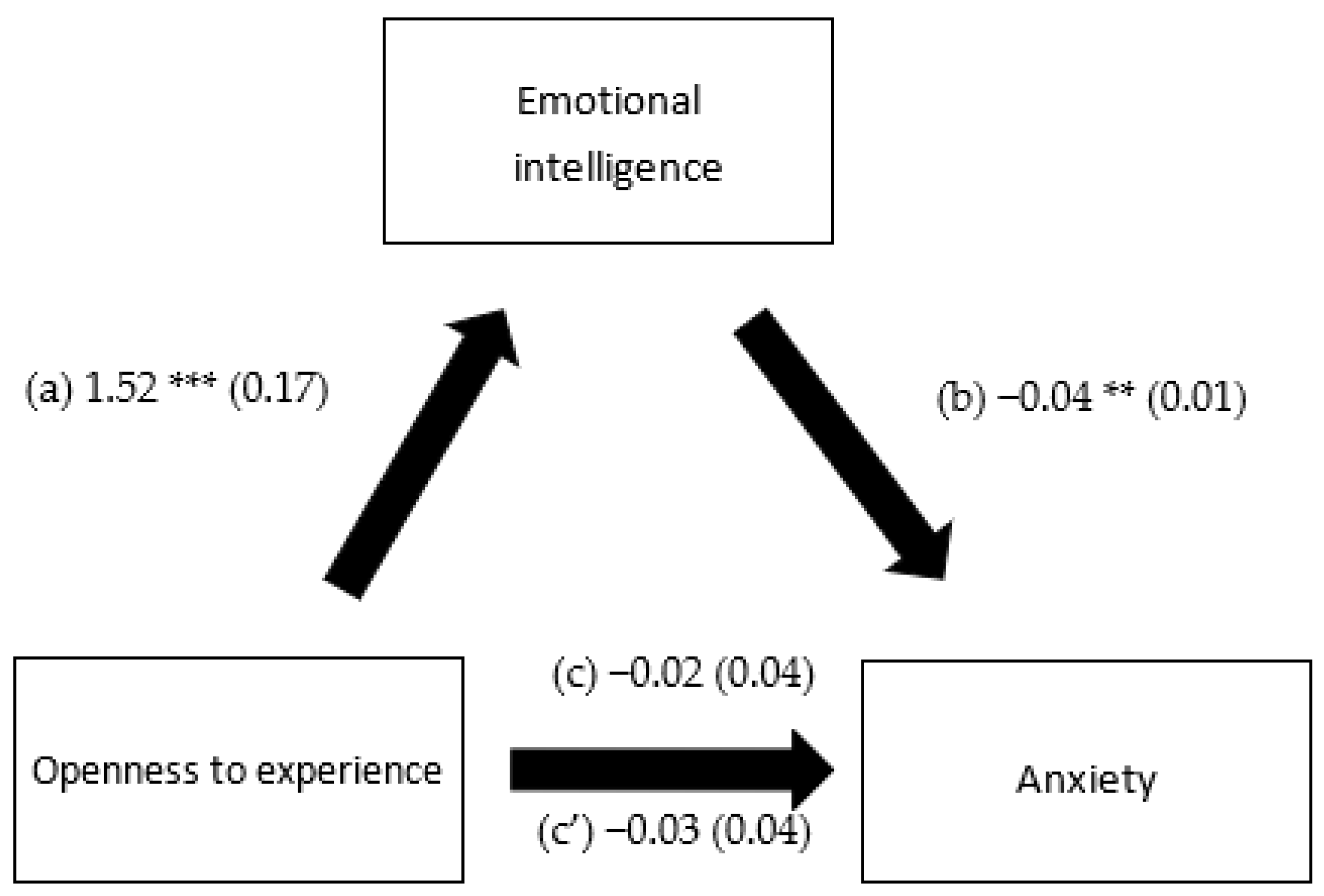Personality Traits and Mental Health among Lebanese Medical Students: The Mediating Role of Emotional Intelligence
Abstract
1. Introduction
2. Materials and Methods
2.1. Study Design
2.2. Sample Size Calculation
2.3. Questionnaire and Variables
2.3.1. Patient Health Questionnaire (PHQ-9)
2.3.2. Generalized Anxiety Disorder (GAD-7)
2.3.3. Perceived Stress Scale (PSS-4)
2.3.4. The Big Five Personality Test (BFI)
2.3.5. The Quick Emotional Intelligence Self-Assessment Scale
2.4. Statistical Analysis
3. Results
3.1. Sociodemographic and Other Characteristics of the Participants
3.2. Bivariate Analysis
3.3. Multivariable Analysis
3.4. Mediation Analysis
4. Discussion
4.1. Personality and Psychological Disorders (Depression, Anxiety and Stress)
4.2. Mediation between Personality Traits, EI and Psychological Disorders
4.3. Clinical Implications
4.4. Limitations
5. Conclusions
Author Contributions
Funding
Institutional Review Board Statement
Informed Consent Statement
Data Availability Statement
Acknowledgments
Conflicts of Interest
References
- Moir, F.; Yielder, J.; Sanson, J.; Chen, Y. Depression in medical students: Current insights. Adv. Med. Educ. Pract. 2018, 9, 323. [Google Scholar] [CrossRef] [PubMed]
- Ahmed, I.; Banu, H.; Al-Fageer, R.; Al-Suwaidi, R. Cognitive emotions: Depression and anxiety in medical students and staff. J. Crit. Care 2009, 24, e1–e7. [Google Scholar] [CrossRef]
- Phomprasith, S.; Karawekpanyawong, N.; Pinyopornpanish, K.; Jiraporncharoen, W.; Maneeton, B.; Phinyo, P.; Lawanaskol, S. Prevalence and Associated Factors of Depression in Medical Students in a Northern Thailand University: A Cross-Sectional Study. Healthcare 2022, 10, 488. [Google Scholar] [CrossRef]
- Mirza, A.A.; Baig, M.; Beyari, G.M.; Halawani, M.A.; Mirza, A.A. Depression and anxiety among medical students: A brief overview. Adv. Med. Educ. Pract. 2021, 12, 393. [Google Scholar] [CrossRef] [PubMed]
- Halperin, S.J.; Henderson, M.N.; Prenner, S.; Grauer, J.N. Prevalence of anxiety and depression among medical students during the Covid-19 pandemic: A cross-sectional study. J. Med. Educ. Curric. Dev. 2021, 8, 2382120521991150. [Google Scholar] [CrossRef] [PubMed]
- Taneja, N.; Gupta, S.; Chellaiyan, V.G.; Awasthi, A.A.; Sachdeva, S. Personality traits as a predictor of emotional intelligence among medical students. J. Educ. Health Promot. 2020, 9, 354. [Google Scholar]
- Evans, D.L.; Foa, E.B.; Gur, R.E.; Hendin, H.; O’Brien, C.P.; Seligman, M.E.; Walsh, B.T. Treating and Preventing Adolescent Mental Health Disorders: What We Know and What We Don’t Know; Oxford University Press: Oxford, UK, 2005. [Google Scholar]
- Maalouf, E.; Hallit, S.; Obeid, S. Personality traits and quality of life among Lebanese medical students: Any mediating effect of emotional intelligence? A path analysis approach. BMC Psychol. 2022, 10, 28. [Google Scholar] [CrossRef]
- Tian-Ci Quek, T.; Wai-San Tam, W.; Tran, B.X.; Zhang, M.; Zhang, Z.; Su-Hui Ho, C.; Chun-Man Ho, R. The global prevalence of anxiety among medical students: A meta-analysis. Int. J. Environ. Res. Public Health 2019, 16, 2735. [Google Scholar] [CrossRef]
- Rotenstein, L.S.; Ramos, M.A.; Torre, M.; Segal, J.B.; Peluso, M.J.; Guille, C.; Sen, S.; Mata, D.A. Prevalence of depression, depressive symptoms, and suicidal ideation among medical students: A systematic review and meta-analysis. Jama 2016, 316, 2214–2236. [Google Scholar] [CrossRef]
- Abouammah, N.; Irfan, F.; Marwa, I.; Zakria, N.; AlFaris, E. Stress among medical students and its consequences on health: A qualitative study. Biomed. Res. 2020, 31, 1–8. [Google Scholar]
- Gazzaz, Z.J.; Baig, M.; Al Alhendi, B.S.M.; Al Suliman, M.M.O.; Al Alhendi, A.S.; Al-Grad, M.S.H.; Qurayshah, M.A.A. Perceived stress, reasons for and sources of stress among medical students at Rabigh Medical College, King Abdulaziz University, Jeddah, Saudi Arabia. BMC Med. Educ. 2018, 18, 29. [Google Scholar] [CrossRef] [PubMed]
- Samaha, A.; Fawaz, M.; Eid, A.; Gebbawi, M.; Yahfoufi, N. Data on the relationship between internet addiction and stress among Lebanese medical students in Lebanon. Data Brief 2019, 25, 104198. [Google Scholar] [CrossRef] [PubMed]
- Mannapur, B.; Dorle, A.; Hiremath, L.; Ghattargi, C.; Ramadurg, U.; Kulkarni, K. A study of psychological stress in undergraduate medical students at SN Medical College, Bagalkot, Karnataka. J. Clin. Diagn. Res. 2010, 4, 2869–2874. [Google Scholar]
- Chow, W.S.; Schmidtke, J.; Loerbroks, A.; Muth, T.; Angerer, P. The relationship between personality traits with depressive symptoms and suicidal ideation among medical students: A cross-sectional study at one medical school in Germany. Int. J. Environ. Res. Public Health 2018, 15, 1462. [Google Scholar] [CrossRef] [PubMed]
- Alizadeh, Z.; Feizi, A.; Rejali, M.; Afshar, H.; Keshteli, A.H.; Adibi, P. The predictive value of personality traits for psychological problems (stress, anxiety and depression): Results from a large population based study. J. Epidemiol. Glob. Health 2018, 8, 124. [Google Scholar] [CrossRef]
- Pappas, S. Personality traits & personality types: What is personality. Live Sci. Web 2017, 2. Available online: https://www.livescience.com/41313-personality-traits.html (accessed on 6 December 2022).
- Gupta, R.; Singh, N.; Kumar, R. Longitudinal predictive validity of emotional intelligence on first year medical students perceived stress. BMC Med. Educ. 2017, 17, 139. [Google Scholar] [CrossRef] [PubMed]
- Yusoff, M.S.B.; Pa, M.N.M.; Mey, S.C.; Aziz, R.A.; Rahim, A.F.A. A longitudinal study of relationships between previous academic achievement, emotional intelligence and personality traits with psychological health of medical students during stressful periods. Educ. Health 2013, 26, 39. [Google Scholar] [CrossRef] [PubMed]
- Naja, W.J.; Kansoun, A.H.; Haddad, R.S. Prevalence of depression in medical students at the Lebanese University and exploring its correlation with Facebook relevance: A questionnaire study. JMIR Res. Protoc. 2016, 5, e4551. [Google Scholar] [CrossRef]
- El Othman, R.; El Othman, R.; Hallit, R.; Obeid, S.; Hallit, S. Personality traits, emotional intelligence and decision-making styles in Lebanese universities medical students. BMC Psychol. 2020, 8, 46. [Google Scholar] [CrossRef]
- Kroenke, K.; Spitzer, R.L. The PHQ-9: A New Depression Diagnostic and Severity Measure; SLACK Incorporated Thorofare: West Deptford, NJ, USA, 2002; Volume 32, pp. 509–515. [Google Scholar]
- Kroenke, K.; Spitzer, R.L.; Williams, J.B.; Löwe, B. The patient health questionnaire somatic, anxiety, and depressive symptom scales: A systematic review. Gen. Hosp. Psychiatry 2010, 32, 345–359. [Google Scholar] [CrossRef] [PubMed]
- Sawaya, H.; Atoui, M.; Hamadeh, A.; Zeinoun, P.; Nahas, Z. Adaptation and initial validation of the Patient Health Questionnaire-9 (PHQ-9) and the Generalized Anxiety Disorder-7 Questionnaire (GAD-7) in an Arabic speaking Lebanese psychiatric outpatient sample. Psychiatry Res. 2016, 239, 245–252. [Google Scholar] [CrossRef] [PubMed]
- Cohen, S.; Kamarck, T.; Mermelstein, R. A global measure of perceived stress. J. Health Soc. Behav. 1983, 24, 385–396. [Google Scholar] [CrossRef] [PubMed]
- John, O.P.; Donahue, E.M.; Kentle, R.L. Big five inventory. J. Personal. Soc. Psychol. 1991. [CrossRef]
- Mohapel, P. The Quick Emotional Intelligence Self Assessment; San Diego City College MESA Program Paul: San Diego, CA, USA, 2015. [Google Scholar]
- Hair, J.F., Jr.; Hult, G.T.M.; Ringle, C.M.; Sarstedt, M. A Primer on Partial Least Squares Structural Equation Modeling (PLS-SEM); Sage Publications: Thousand Oaks, CA, USA, 2021. [Google Scholar]
- Chen, Y.T.; Lai, C.S. Personality traits, emotional intelligence and academic achievements of university students. Am. J. Appl. Psychol. 2015, 4, 39. [Google Scholar] [CrossRef][Green Version]
- Bughi, S.A.; Lie, D.A.; Zia, S.K.; Rosenthal, J. Using a personality inventory to identify risk of distress and burnout among early stage medical students. Educ. Health 2017, 30, 26. [Google Scholar] [CrossRef] [PubMed]
- Tyssen, R.; Dolatowski, F.C.; Røvik, J.O.; Thorkildsen, R.F.; Ekeberg, Ø.; Hem, E.; Gude, T.; Grønvold, N.T.; Vaglum, P. Personality traits and types predict medical school stress: A six-year longitudinal and nationwide study. Med. Educ. 2007, 41, 781–787. [Google Scholar] [CrossRef]
- Purnamasari, Y.; Cahyani, D. The Effect of Neuroticism on Psychological Distress in Medical Students. In Proceedings of 4th ASEAN Conference on Psychology, Counselling, and Humanities (ACPCH 2018), Surat Thani, Thailand, 9–10 November 2018; pp. 131–133. [Google Scholar]
- Seliger, K.; Brähler, E. Psychische gesundheit von studierenden der medizin. Psychotherapeut 2007, 52, 280–286. [Google Scholar] [CrossRef]
- Panchu, P.; Ali, S.; Thomas, T. The interrelationship of personality with stress in medical students. Int. J. Clin. Exp. Physiol. 2016, 3, 134. [Google Scholar] [CrossRef]
- Chibnall, J.T.; Blaskiewicz, R.J.; Detrick, P. Are medical students agreeable? An exploration of personality in relation to clinical skills training. Med. Teach. 2009, 31, e311–e315. [Google Scholar] [CrossRef][Green Version]
- Mehanna, Z.; Richa, S. Prevalence of anxiety and depressive disorders in medical students. Transversal study in medical students in the Saint-Joseph University of Beirut. Encephale 2006, 32, 976–982. [Google Scholar] [CrossRef] [PubMed]
- Getzmann, S.; Digutsch, J.; Kleinsorge, T. COVID-19 pandemic and personality: Agreeable people are more stressed by the feeling of missing. Int. J. Environ. Res. Public Health 2021, 18, 10759. [Google Scholar] [CrossRef] [PubMed]
- Kousha, M.; Bagheri, H.A.; Heydarzadeh, A. Emotional intelligence and anxiety, stress, and depression in Iranian resident physicians. J. Fam. Med. Prim. Care 2018, 7, 420. [Google Scholar] [CrossRef] [PubMed]
- Yamani, N.; Shahabi, M.; Haghani, F. The relationship between emotional intelligence and job stress in the faculty of medicine in Isfahan University of Medical Sciences. J. Adv. Med. Educ. Prof. 2014, 2, 20. [Google Scholar]
- James, C.; Bore, M.; Zito, S. Emotional intelligence and personality as predictors of psychological well-being. J. Psychoeduc. Assess. 2012, 30, 425–438. [Google Scholar] [CrossRef]
- Ghahramani, S.; Jahromi, A.T.; Khoshsoroor, D.; Seifooripour, R.; Sepehrpoor, M. The relationship between emotional intelligence and happiness in medical students. Korean J. Med. Educ. 2019, 31, 29. [Google Scholar] [CrossRef]
- Noshili, A.I.; Batool, R.; Najmi, A.A.; Najmi, M.A.; Abiri, H.M.A.; Khubrani, F.Y.G.; Taweel, F.M.M.A.; Alhurrath, A.A.H.; Hamzi, J.M. Relationship Between Personality Trait, And Mental Health Well-Being, The Mediating Role Of Emotional Intelligence Among Healthcare Workers In Jizan, KSA. J. Posit. Sch. Psychol. 2022, 6, 1833–1851. [Google Scholar]
- Johnson, S.J.; Batey, M.; Holdsworth, L. Personality and health: The mediating role of trait emotional intelligence and work locus of control. Personal. Individ. Differ. 2009, 47, 470–475. [Google Scholar] [CrossRef]
- Tao, Y.; Liu, X.; Hou, W.; Niu, H.; Wang, S.; Ma, Z.; Bi, D.; Zhang, L. The Mediating Role of Emotion Regulation Strategies in the Relationship Between Big Five Personality Traits and Anxiety and Depression Among Chinese Firefighters. Front. Public Health 2022, 10, 901686. [Google Scholar] [CrossRef]




| Variable | n (%) |
|---|---|
| Gender | |
| Male | 130 (43.9%) |
| Female | 166 (56.1%) |
| Governorate | |
| Beirut | 28 (9.5%) |
| Mount Lebanon | 124 (41.9%) |
| North | 74 (25.0%) |
| South | 37 (12.5%) |
| Bekaa | 33 (11.1%) |
| Monthly income | |
| Low (<1000 USD) | 21 (7.1%) |
| Intermediate (1000–2000 USD) | 133 (44.9%) |
| High (>2000 USD) | 142 (48.0%) |
| University | |
| American University of Beirut | 20 (6.8%) |
| Beirut Arab University | 13 (4.4%) |
| Holy Spirit University of Kaslik | 133 (44.9%) |
| Lebanese American University | 17 (5.7%) |
| Lebanese University | 80 (27.0%) |
| Saint Joseph University | 14 (4.7%) |
| University of Balamand | 19 (6.4%) |
| Variable | Depression | Anxiety | Stress |
|---|---|---|---|
| Gender | |||
| Male | 8.24 ± 6.67 | 5.81 ± 5.33 | 14.39 ± 6.45 |
| Female | 8.34 ± 6.49 | 6.96 ± 5.34 | 15.67 ± 5.82 |
| p | 0.898 | 0.065 | 0.076 |
| Effect size | 0.015 | 0.215 | 0.208 |
| Monthly income | |||
| Low (<1000$) | 9.81 ± 6.52 | 7.24 ± 5.38 | 16.61 ± 5.14 |
| Intermediate (1000–2000$) | 9.22 ± 6.82 | 7.45 ± 5.53 | 15.28 ± 5.80 |
| High (>2000$) | 7.20 ± 6.17 | 5.41 ± 5.01 | 14.72 ± 6.55 |
| p | 0.021 | 0.005 | 0.384 |
| Effect size | 0.163 | 0.191 | 0.081 |
| Variable | Depression | Anxiety | Stress |
|---|---|---|---|
| Depression | 1 | ||
| Anxiety | r = 0.655; p < 0.001 | 1 | |
| Stress | r = 0.359; p < 0.001 | r = 0.392; p < 0.001 | 1 |
| Age | r = −0.034; p = 0.562 | r = −0.02; p = 0.728 | r = 0.113; p = 0.051 |
| Extraversion | r = −0.310; p < 0.001 | r = −0.267; p < 0.001 | r = −0.105; p = 0.07 |
| Agreeableness | r = 0.021; p = 0.721 | r = 0.062; p = 0.290 | r = 0.257; p < 0.001 |
| Conscientiousness | r = −0.019; p = 0.751 | r = 0.036; p = 0.542 | r = 0.1; p = 0.086 |
| Neuroticism | r = −0.479; p < 0.001 | r = −0.549; p < 0.001 | r = −0.257; p < 0.001 |
| Openness to experience | r = 0.181; p = 0.002 | r = 0.165; p = 0.004 | r = 0.269; p < 0.001 |
| Emotional intelligence | r = −0.072; p = 0.218 | r = −0.078; p = 0.181 | r = 0.05; p = 0.395 |
| Model 1: Linear Regression Taking the Depression Score as the Dependent Variable. | ||||
|---|---|---|---|---|
| Variable | Unstandardized Beta | Standardized Beta | p | 95% CI |
| Stress | 0.48 | 0.24 | <0.001 | 0.28–0.68 |
| Extraversion | −0.14 | −0.19 | 0.006 | −0.18–−0.03 |
| Neuroticism | −0.28 | −0.38 | <0.001 | −0.36–−0.20 |
| Emotional intelligence | −0.03 | −0.13 | 0.03 | −0.06–−0.003 |
| Model 2: Linear regression taking the anxiety score as the dependent variable. | ||||
| Variable | Unstandardized Beta | Standardized Beta | p | 95% CI |
| Stress | 0.44 | 0.27 | <0.001 | 0.29–0.60 |
| Neuroticism | −0.29 | −0.48 | <0.001 | −0.35–−0.23 |
| Emotional intelligence | −0.03 | −0.14 | 0.011 | −0.05–−0.01 |
| Model 3: Linear regression taking the stress score as the dependent variable. | ||||
| Variable | Unstandardized Beta | Standardized Beta | p | 95% CI |
| Openness to experience | 0.07 | 0.17 | 0.013 | 0.02–0.13 |
| Agreeableness | 0.08 | 0.19 | 0.002 | 0.03–0.13 |
| Neuroticism | −0.05 | −0.14 | 0.025 | −0.10–−0.01 |
| Emotional intelligence | −0.01 | −0.09 | 0.206 | −0.03–0.01 |
| Mediator | Direct Effect | Indirect Effect | ||||
|---|---|---|---|---|---|---|
| Beta | SE | p | Beta | Boot SE | Boot CI | |
| Model 1: Depression as the Dependent Variable | ||||||
| Extraversion | −0.11 | 0.04 | 0.005 | −0.03 | 0.01 | −0.06; −0.01 * |
| Neuroticism | −0.31 | 0.04 | <0.001 | −0.01 | 0.01 | −0.01; 0.02 |
| Openness to experience | 0.07 | 0.05 | 0.173 | −0.06 | 0.02 | −0.10; −0.01 * |
| Model 2: Anxiety as the dependent variable | ||||||
| Extraversion | −0.04 | 0.03 | 0.158 | −0.02 | 0.01 | −0.05; −0.01 * |
| Neuroticism | −0.31 | 0.03 | <0.001 | 0.005 | 0.01 | −0.01; 0.02 |
| Openness to experience | 0.03 | 0.04 | 0.463 | −0.05 | 0.02 | −0.09; −0.02 * |
| Model 3: Stress as the dependent variable | ||||||
| Agreeableness | 0.08 | 0.03 | 0.001 | 0.001 | 0.004 | −0.01; 0.01 |
| Neuroticism | −0.06 | 0.02 | 0.006 | −0.001 | 0.003 | −0.01; 0.01 |
| Openness to experience | 0.08 | 0.03 | 0.006 | −0.02 | 0.02 | −0.05; 0.02 |
Publisher’s Note: MDPI stays neutral with regard to jurisdictional claims in published maps and institutional affiliations. |
© 2022 by the authors. Licensee MDPI, Basel, Switzerland. This article is an open access article distributed under the terms and conditions of the Creative Commons Attribution (CC BY) license (https://creativecommons.org/licenses/by/4.0/).
Share and Cite
Sfeir, E.; El Othman, R.; Barakat, M.; Hallit, S.; Obeid, S. Personality Traits and Mental Health among Lebanese Medical Students: The Mediating Role of Emotional Intelligence. Healthcare 2022, 10, 2516. https://doi.org/10.3390/healthcare10122516
Sfeir E, El Othman R, Barakat M, Hallit S, Obeid S. Personality Traits and Mental Health among Lebanese Medical Students: The Mediating Role of Emotional Intelligence. Healthcare. 2022; 10(12):2516. https://doi.org/10.3390/healthcare10122516
Chicago/Turabian StyleSfeir, Elsa, Radwan El Othman, Muna Barakat, Souheil Hallit, and Sahar Obeid. 2022. "Personality Traits and Mental Health among Lebanese Medical Students: The Mediating Role of Emotional Intelligence" Healthcare 10, no. 12: 2516. https://doi.org/10.3390/healthcare10122516
APA StyleSfeir, E., El Othman, R., Barakat, M., Hallit, S., & Obeid, S. (2022). Personality Traits and Mental Health among Lebanese Medical Students: The Mediating Role of Emotional Intelligence. Healthcare, 10(12), 2516. https://doi.org/10.3390/healthcare10122516







